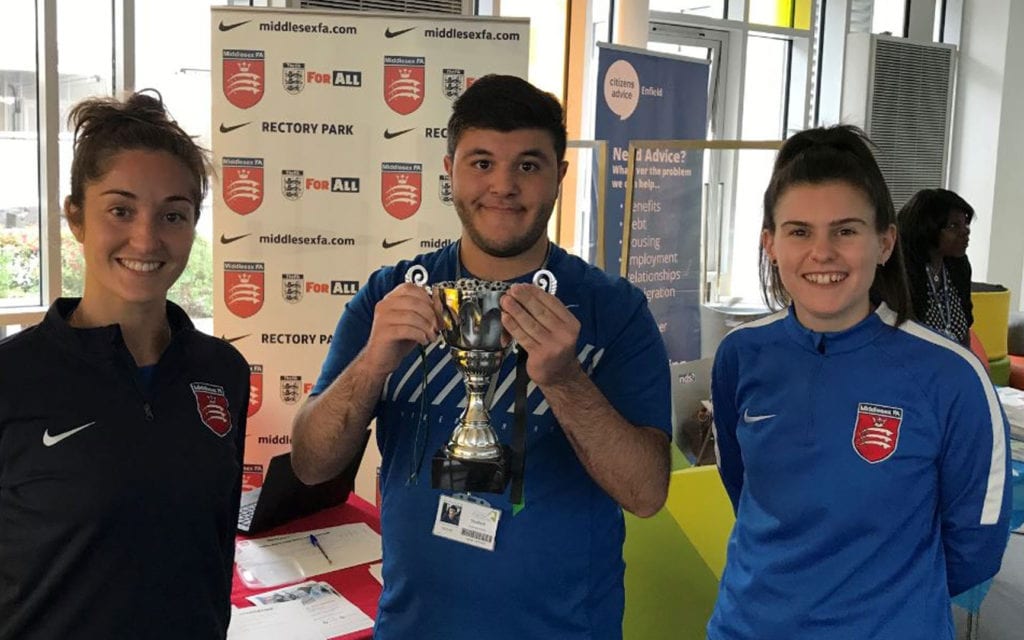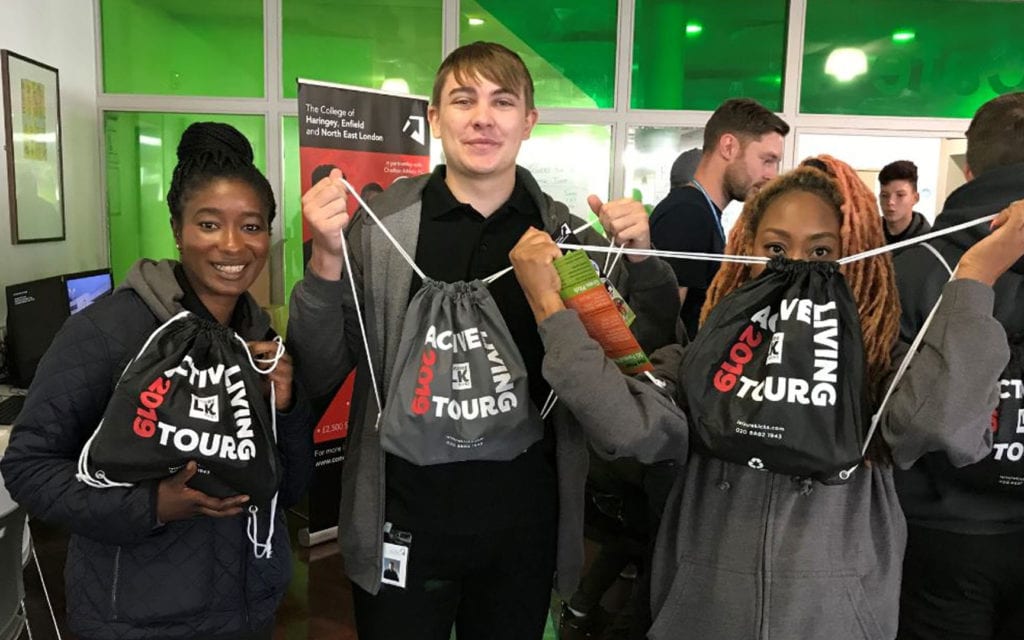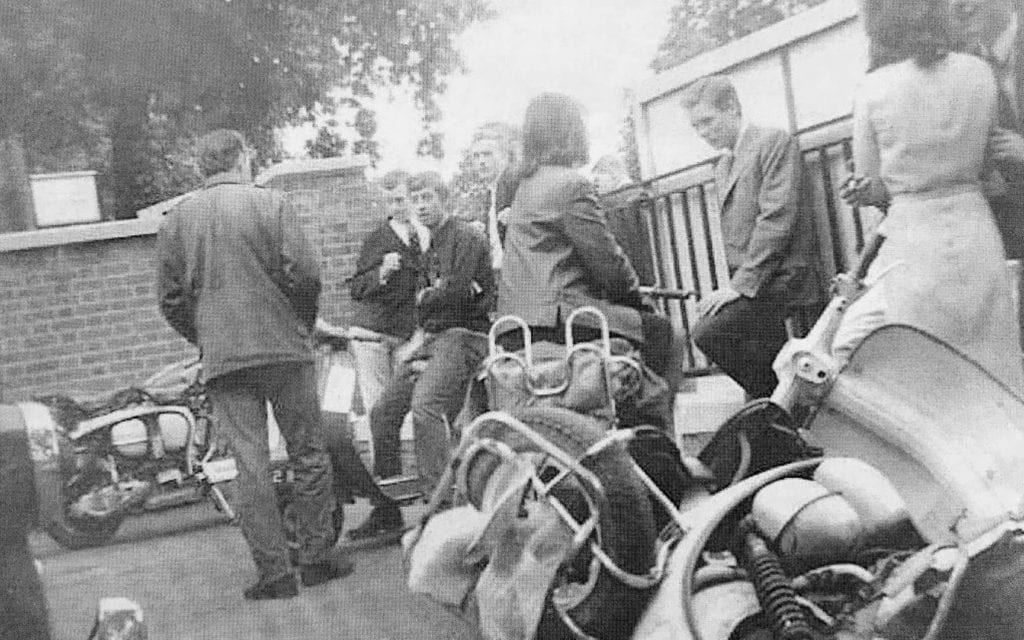Month: September 2019
Following a successful bid at the end of 2018, The College of Haringey, Enfield, and North East London was awarded £150,000 from the Mayor’s Young Londoners Fund. Over the next three years, CONEL will be using this money to invest in a range of initiatives that will support over 700 vulnerable teenagers across six London boroughs who are at risk of falling into a life of crime.
The programme is currently working with a total of 240 young people aged between 14 and 21 years old. Through the programme, our aim is to provide education, support and activities for participants that will deter them from getting involved in criminal activities and help them to make better life choices.
Six London boroughs refer people to the programme – Haringey, Enfield, Barnet, Islington, Camden and Waltham Forest. “The young people who are on the programme have been identified as ‘at risk’”, explains Jonathan Silman (Head of School for Key Stage 4 at CONEL). “This means that most of them have been repeatedly suspended, or even expelled, from secondary school. Many have experienced things that no child should have to see – they need support and a safe space, as well as an education.
“Many of the students on the programme (the gender mix is approximately 50:50) have experienced a traumatic incident or incidents, such as seeing a friend stabbed or killed, or they live in abusive or dysfunctional households – maybe with no parents or a single parent who is finding it hard to cope.” In addition, many of them have been involved in gang activity and some have been forced to work in ‘county lines’ drug dealing operations, where gangs and organised crime networks exploit children to sell drugs.
Because the young people’s needs vary by their age and ability, there are two parts to the programme: one that works with 14-16 year olds and the other that supports 16-21 year olds.
Support for 14-16 year olds
For the 90 14-16 year olds (Key Stage 4), there are two pathways in the programme – both of which provide full-time education and support to the students:
- The GCSE pathway, where the main objective is to enable students to take 5 GCSEs and achieve grades 5-9 in those subjects – setting them up for taking A levels, or progressing into work, an apprenticeship or study a vocational course like a BTEC or NVQ (National Vocational Qualification). The students take lessons in the core GCSE subjects including English and maths, as well as Level 1 vocational qualifications in sport, construction and hair & beauty.
- The Functional Skills pathway, which is for students who need more support – here the objective is for participants to improve their basic English and maths skills to a level where they can take some functional skills exams or enrol at a Further Education college, like CONEL. Subjects taken can include English, maths, catering, music, sport, construction and hair & beauty at Level 1.
Mental Health Support
Many of the programme’s participants are also living with mental health problems as a result of the traumatic things they have experienced in their young lives, so it’s vital that the programme can help students address these issues too. As Jonathan Silman explains: “Mental ill-health is a massive issue in the UK, but especially among less well-off young Londoners. Funding for children’s mental health services has been cut across London and waiting lists for accessing the specialist Child and Adolescent Mental Health Services that they need, can, in some cases be over a year.
“In the meantime, we need to help the teenagers on our programme start to understand, process and come to terms with their experiences, so we have brought in a Psychotherapist who is working with the 14-16 year olds initially to support them. She has been talking to the teenagers, assessing the nature of their trauma, and grades their skills (how good they are at listening, speaking, reading and writing), to see if they are suitable for the GCSE pathway or the Functional Skills one.
“We’re already seeing a big difference on the teenagers’ engagement and attainment. The psychotherapy is working and the students are receptive to the support they are getting from CONEL. For many, it’s the first time that someone has really tried to understand what they’ve been through.”
Support for Older Students
The other strand of the programme is supporting 150 16-21 year olds. Typically they are students of the college on other courses, but they may be struggling with their studies and have been referred onto the programme by their tutors.
These students attend six weeks of one-hour group mentoring to help motivate them and help them stay on track with their studies. It also aims to deter students from getting involved in criminal activities by showing them the likely outcomes of doing so.
As Anthony Robinson (CONEL’s Head of Learner Experience and Industry Placements) explains: “A lot of the students on this programme have made bad life choices in the past and we want them to have opportunities to step off that path. The mentoring sessions are really useful for the students. Different sessions address different aspects including peer pressure – the role of the students’ friends and peers in pressuring them to act in certain ways – the importance of having an education on their life chances. It’s all about getting the students more engaged and motivated with their courses and reduce their risk level of getting into criminal activity.”
So far, 184 students have now completed the mentoring programme. Student Eraycan Karaks, said: “It was enjoyable, it teaches you a lot about not getting involved with gangs. It has shown me what will happen to me if I join a gang or follow people I think are my friends.”
The programme’s mentors are Royston Johns and Nyki Clark, vastly experienced mentors with over 30 years’ experience of working with young people from challenging backgrounds. They are experts on gang intervention and motivating young people to change their lives around.
In addition, students have heard from inspiring speakers from similar backgrounds to their own, including Amani Simpson, who was stabbed seven times in 2011 and who now speaks to young people about his experiences before and after the attack.
The Scourge of Knife Crime
Knife crime is a huge concern for young Londoners and many of the students on our programme have experienced this too. So, we’ve been running engaging knife crime events which offer an environment for students and staff to discuss and learn about the issues. Public Services Level 3 student Syed Salam, was on the programme and attended one of these events. He said: “This was an excellent event for us to hear about the effects of knife-crime on families and the wider community. Hearing from various organisations that are involved in tackling knife crime at a grassroots level was good, as I now know what they are doing, and how I can get involved in helping to reduce knife crime in my community.”
Anthony Robinson said: “We aim to expand our mentoring programme to help more young people and put on a range of different events and workshops that tackle the issues young people face and keep them away from crime.”
A new ESF and London Growth Hub initiative, Start Up, Step Up London, launched on Wednesday 18 September 2019, to help open pathways and support enterprise skills for Londoners currently under-represented in entrepreneurship.
Delivered by Visionnaires, part of Capital City College Group, the pioneering programme will give participants access to workshops, targeted skills training, coaching and mentoring.
Deputy Mayor for Business, Rajesh Agrawal said: “I know first-hand the power of entrepreneurship to transform lives. But we need to do more to ensure that Londoners – and especially women – from diverse backgrounds have the opportunity and the know-how to start and grow a business. Step Up, Start Up can make a huge impact, and I’m proud we’re launching it today.”
Start Up, Step Up London is part of the Mayor of London’s commitment to improving diversity and representation in London’s entrepreneurship and follows extensive consultation held by the London Growth Hub over the last 18 months.
It is built directly on the recommendations of current and budding entrepreneurs from diverse backgrounds not traditionally represented in start up businesses, including women, people with disabilities and from BAME, and low income backgrounds.
Jackie Chapman, Operations Director at Capital City College Group, said: “This is an exciting opportunity to change the face of entrepreneurship in London and harness the talent of London’s next wave of budding business leaders. We are delighted to be working with the London Growth Hub to deliver this exciting initiative.”
The new programme will help create a new generation of entrepreneurs and businesses through two streams – ‘Start Up’ and ‘Step Up’.
Participants will receive training, access to co-working spaces and support from an entrepreneurial mentor to inspire and advise on challenges and solutions when launching a new business.
To find out more about the programme and register your interest, visit the London Growth Hub. Start Up, Step Up London is presented by the London Growth Hub and the European Social Fund.
The London Growth Hub is an initiative of LEAP, London’s local enterprise partnership and is supported by the Mayor of London and HM Government.
Newly enrolled students attended the first of two Freshers’ Fairs at the College of Haringey, Enfield and North East London’s Enfield Centre on Wednesday 11 September 2019.
The event had a variety of different information stalls, showing the opportunities – both inside and outside the college – that students can enjoy in the coming year of study. The Sports department were showcasing their Football, Basketball and Mixed Martial Arts academies, the Careers Services team explained the services they offer, the Student Ambassadors team were recruiting and the new CONEL E-SPORTS group displayed their games and schedules.
We also had companies and local organisations in attendance, including: Bywaters, Enfield’s local youth centres, Project Rugby, Middlesex FA, Chance to Shine [Free street cricket], Citizens Advice (Enfield), HSBC, Healthwatch (Enfield), NHS Lets Talk, and Speak like a Native. The Middlesex FA ran a competition in which participants guessed the number of chocolate footballs in the trophy.

Winning student, Abed Elkurdi, from West Lea School, a special educational needs school which works in partnership with CONEL, was very pleased to win the 161 chocolate footballs. He said: “I am going to share them all with my friends.”
Sports Development Co-ordinator, Robert Murphy, said: “The Fresher’s Fair is a great opportunity for us to let the students know about all the amazing sports and enrichment opportunities we offer at the college. We also had competitions going on in standing long jump, sit and reach flexibility test and a grip strength test for which the prize was a week’s gym membership at the college. It was great fun.”

Khaled Ahmed, from Middlesex cricket, said: “It has been great to be here today and recruit so many students. We have been promoting our new Free Street Cricket – it’s a fast-paced version of the game played with a tapeball – a tennis ball wrapped in electrical tape – in small enclosed spaces. With six players per team and 20 balls per innings, it’s cricket’s answer to five-a-side football! We will be at CONEL’s Enfield centre from 6pm-8pm every term time Monday in sports hall.”
As students start enrolling at the College of Haringey, Enfield and North East London for the new academic year, we’re taking a look back in time to the early 1960s, when the Beatles had their first #1 hit, London’s Centre Point was still a set of architect’s plans and Harold Macmillan was Prime Minister.
Andy Thomas, Richard Tresise and Ian Carpenter were teenagers in 1963 and studied for their GCEs at the what-was-then-called Tottenham Technical College. They recently returned to our Tottenham Centre for the first time since they left, to reminisce on the past and see how the college has changed in the last 56 years.
There is a long tradition of technical education in the Tottenham and wider Haringey areas. Since its founding in 1897, the college has offered a wide range of relevant and practical courses, including Physiology and Hygiene, Science, Technology, Building Construction, Plumbing, Carpentry and Land Surveying. With the success of such ‘multi-skill’ training, the college expanded to accommodate a large increase in admissions, to well over 100,000 students by the 1950s.
CONEL maintains this tradition of providing technical and skills education to the local area. One significant growth area is construction and its related trades – as the UK prepares to leave the EU, we anticipate an explosion in demand for construction skills, as many older UK-born construction workers retire and those from EU countries decide to return home. Today the college operates one of only seven Mayor’s Construction Academy Hubs, and currently has over 150 Apprentices in various construction specialities such as brickwork, carpentry and joinery, construction, electrical instillation and plumbing.
During their visit to the college, Andy, Richard and Ian met Interim Principal, Kurt Hintz and Director, Marcia Summers, and had a tour of CONEL’s modern facilities. Reminiscing on the old days, Andy said: “The college gave us skills that helped us with our careers as well as at home. Doing the multi-skills course meant I could do the painting and decorating, build a wall and do general DIY around the house.”

Their time at the college set them up for their lives, with Andy and Richard both going on to work in insurance and Ian in trade. And Ian discovered that his relationship with the college extends even further, when he found out that his granddad had been the caretaker over 100 years ago.
To this day, CONEL provides its students with more than just a qualification: we understand the importance of transferrable skills such as good communication, team work and leadership when in work, especially as research suggests that millennials entering the job market will have an average of 10-12 jobs in their life and will therefore have to be more flexible than ever to adapt to changes in the job market.
This was backed up recently by our progression and destinations report, which showed that of the 7,045 CONEL learners, 96% progressed to a ‘positive destination’, meaning they either sustained employment and/or entered further learning. This is a 7% increase based on the 16/17 academic year.













